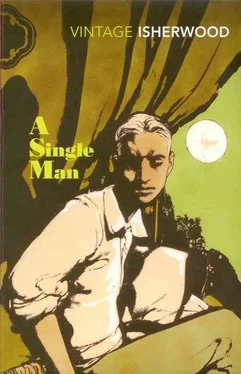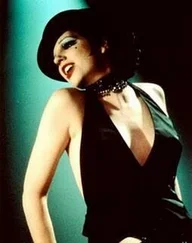As they walk toward the classroom, Dreyer asks George what he thinks about what Dr Leavis said about Sir Charles Snow. (These far-off unhappy Old Things and their long-ago battles are still hot news out here in Sleepy Hollow State.) ‘Well, first of all —’ George begins.
They are passing the tennis courts, at this moment. Only one court is occupied, by two young men playing singles. The sun has come out with sudden fierce heat through the smog-haze, and the two are stripped nearly naked. They have nothing on their bodies but rubber gym-boots and knit shorts of the kind cyclists wear, very short and close-fitting, moulding themselves to the buttocks and the loins. They are absolutely unaware of the passers-by, isolated in the intentness of their game. You would think there was no net between them. Their nakedness makes them seem close to each other and directly opposed, body to body, like fighters. If this were a fight, though, it would be one-sided, for the boy on the left is much the smaller. He is Mexican maybe, black-haired, handsome, catlike, cruel, compact, lithe, muscular; quick and graceful on his feet. His body is a natural dark gold brown; there is a fuzz of curly black hair on his chest and belly and thighs. He plays hard and fast, with cruel mastery, baring his white teeth unsmiling, as he slams back the ball. He is going to win. His opponent, the big blond boy, already knows this; there is a touching gallantry in his defence. He is so sweet-naturedly beautiful, so nobly made; and yet his classical cream marble body seems a handicap to him. The rules of the game inhibit it from functioning. He is fighting at a hopeless disadvantage. He should throw away his useless racket, vault over the net, and force the cruel little gold cat to submit to his marble strength. No, on the contrary, the blond boy accepts the rules, binds himself by them, will suffer defeat and humiliation rather than break them. His helpless bigness and blondness give him an air of unmodern chivalry. He will fight clean, a perfect sportsman, until he has lost the last game. And won’t this keep happening to him all through his life? Won’t he keep getting himself involved in the wrong kind of game, the kind of game he was never born to play, against an opponent who is quick and clever and merciless?
This game is cruel; but its cruelty is sensual and stirs George into hot excitement. He feels a thrill of pleasure to find the senses so eager in their response; too often, now, they seem sadly jaded. From his heart, he thanks these young animals for their beauty. And they will never know what they have done to make this moment marvellous to him, and life itself less hateful —
Dreyer is saying, ‘Sorry, Sir – I lost you for a minute, there. I understand about the Two Cultures, of course – but, do you mean you agree with Dr Leavis?’ Far from taking the faintest interest in the tennis players, Dreyer walks with his body half turned away from them; his whole concentration fixed upon George’s talking head.
For it obviously has been talking. George realises this with the same discomfiture he felt on the freeway, when the chauffeur-figure got them clear downtown. Oh yes, he knows from experience what the talking-head can do, late in the evening, when he is bored and tired and drunk, to help him through a dull party. It can play back all of George’s favourite theories – just as long as it isn’t argued with; then it may become confused. It knows at least three dozen of his best anecdotes. But here , in broad daylight, during campus-hours, when George should be onstage every second, in full control of his performance! Can it be that talking-head and the chauffeur are in league? Are they maybe planning a merger?
‘We really haven’t time to go into all this right now,’ he tells Dreyer smoothly. ‘And anyhow, I’d like to check up on the Leavis lecture again. I’ve still got that issue of The Spectator somewhere at home, I think. . . . Oh, by the way, did you ever get to read that piece on Mailer, about a month ago – in Esquire , wasn’t it? It’s one of the best things I’ve seen in a long time —’
George’s classroom has two doors in its long side wall: one up front, the other at the back of the room. Most of the students enter from the back because, with an infuriating sheep-obstinacy, they love to huddle together confronting their teachers from behind a barricade of empty seats. But, this semester, the class is only a trifle smaller than the capacity of the room. Latecomers are forced to sit farther and farther forward, to George’s sly satisfaction; finally they have to take the second row. As for the front row, which most of them shun so doggedly, George can fill that up with his regulars: Russ Dreyer, Tom Kugelman, Sister Maria, Mr Stoessel, Mrs Netta Torres, Kenny Potter, Lois Yamaguchi.
George never enters the classroom with Dreyer, or any other student. A deeply-rooted dramatic instinct forbids him to do so. This is really all that he uses his office for; as a place to withdraw into before class, simply in order to re-emerge from it and make his entrance. He doesn’t interview students in it, because these offices are shared by at least two faculty members, and Dr Gottlieb, who teaches the Metaphysical Poets, is nearly always there. George cannot talk to another human being as if the two of them were alone, when in fact they aren’t. Even such a harmless question as, ‘What do you honestly think of Emerson?’ sounds indecently intimate, and such a mild criticism as, ‘What you’ve written is a mixed metaphor and it doesn’t mean anything’ sounds unnecessarily cruel, when Dr Gottlieb is right there at the other desk listening or, what’s worse, pretending not to listen. But Gottlieb obviously doesn’t feel this way. Perhaps it is a peculiarly British scruple.
So now, leaving Dreyer, George goes into the office. It is right across the hallway. Gottlieb isn’t there, for a wonder. George peeps out of the window, between the slats of the Venetian blinds, and sees, in the far distance, the two tennis players still at their game. He coughs, fingers the telephone directory without looking at it, closes the empty drawer in his desk, which has been pulled open a little. Then, abruptly, he turns, takes his briefcase out of the closet, leaves the office and crosses to the front classroom door.
His entrance is quite undramatic, according to conventional standards. Nevertheless, this is a subtly contrived, outrageously theatrical effect. No hush falls as George walks in. Most of the students go right on talking. But they are all watching him, waiting for him to give some sign, no matter how slight, that the class is to begin. The effect is a subtle but gradually increasing tension, caused by George’s teasing refusal to give this sign and the students’ counter-determination not to stop talking until he gives it.
Meanwhile, he stands there. Slowly, deliberately, like a magician, he takes a single book out of his briefcase and places it on the reading-desk. As he does this, his eyes move over the faces of the class. His lips curve in a faint but bold smile. Some of them smile back at him. George finds this frank confrontation extraordinarily exhilarating. He draws strength from these smiles, these bright young eyes. For him, this is one of the peak moments of the day. He feels brilliant, vital, challenging, slightly mysterious and, above all , foreign . His neat dark clothes, his white dress shirt and tie (the only tie in the room) are uncompromisingly alien from the aggressively virile informality of the young male students. Most of these wear sneakers and garterless white wool socks; jeans in cold weather and in warm weather shorts (the thigh-clinging Bermuda type; the more becoming short ones aren’t considered quite decent). If it is really warm, they’ll roll up their sleeves and sometimes leave their shirts provocatively unbuttoned to show curly chest-hair and a Christopher medal. They look as if they were ready at any minute to switch from studying to ditch-digging or gang-fighting. They seem like mere clumsy kids in contrast with the girls; for these have all outgrown their teenage phase of Capri pants, sloppy shirts and giant heads of teased-up hair. They are mature women, and they come to class dressed as if for a highly respectable party.
Читать дальше












